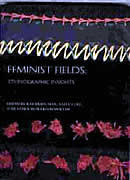home
REVIEWS
Feminist Fields: Ethnographic Insights

Habib,
Jasmin. 2002. Book Review. Feminist Fields: Ethnographic Insights.
Anthropologica XLIV: 309-311.
The
best essays offer exceptional insights and are accessible, reflexive,
and most importantly for someone reading this text for its methodological
contributions, ('ethnographic insights' being the title of the
book), they challenge feminists to re-think the study of gender
in anthropological terms. The book covers a range of topics in
17 essays, including the role of women and feminism in academia;
the problematic representation of women's practices; the changing
social and political economies and their effects on women; the
frontiers of women's organizing and political practices; and reflexive
feminism in the 'field.'
Baker,
Patricia. 2001. Book Review. Feminist Fields: Ethnographic Insights.
Canadian Review of Sociology and Anthropology 38(1):107-109.
(Available on-line.)
The
final chapter, Feminist Fields: Conversations To Be Continued"
... is not a typical conclusion for an edited collection. Rather,
this chapter comprises an e-mail/fax 'multilogue' among the contributors,
wherein they reflect upon the place of their work within anthropology
and their thoughts as to the future directions of the relationship
between feminism and anthropology. It is a conversation of hope,
caution, and concern about the sometimes-problematic relationship
of anthropology and feminism, now and in the future—a relationship
continuously shaped by the tensions that often accompany feminist
struggles with disciplinary boundaries....'Feminist Fields: Ethnographic
Insights' attests to the dynamism of feminist anthropology in
Canada today and its importance in the future.
Holmes,
Christina. 2000. Book Review. Feminist Fields: Ethnographic
Insights. Cultural Reflections: Journal of the Graduate
Students of Anthropology 2[Spring]: 70-71.
I
enjoyed the way that generalized perspectives were contextualized.
I also found the ethical and theoretical dilemmas, which the various
authors encountered, to be of great interest. The book does fail
to circle around a central, well-defined perspective. However,
as the book does a good job of discussing and representing some
of the difficulties involved in feminism in Anthropology at the
moment, this would have been hard to avoid. As Sally Cole put
it,
A
goal of the volume was to report on research by scholars who
identify themselves as feminist ethnographers, who are engaged
in the everyday lives of women, who write in ways that are accessible
to a wide range of readers, and who are working to keep open
the intellectual and social spaces within which women can continue
to 'tell their stories' (p. 301, Feminist Fields: Ethnographic
Insights).
Anonymous.
1999. The Women's Studies Shelf. Wisconsin Bookwatch [December]:
7.
Young
practitioners are to be found alongside more established scholars
in sharing theoretical insights brought to life through first-person
narratives and stories. Throughout 'Feminist Fields' there is a clear
sense of the intellectual inspiration to be had from the practice
of feminist anthropology and its emphasis on the power of thoughtful
reflexivity in fieldwork and writing practices. 'Feminist Fields'
provides an invaluable, highly recommended service to women's studies,
anthropology, and the feminist movement through showcasing knowledge
formerly forgotten, ignored, and actively silenced.
|
